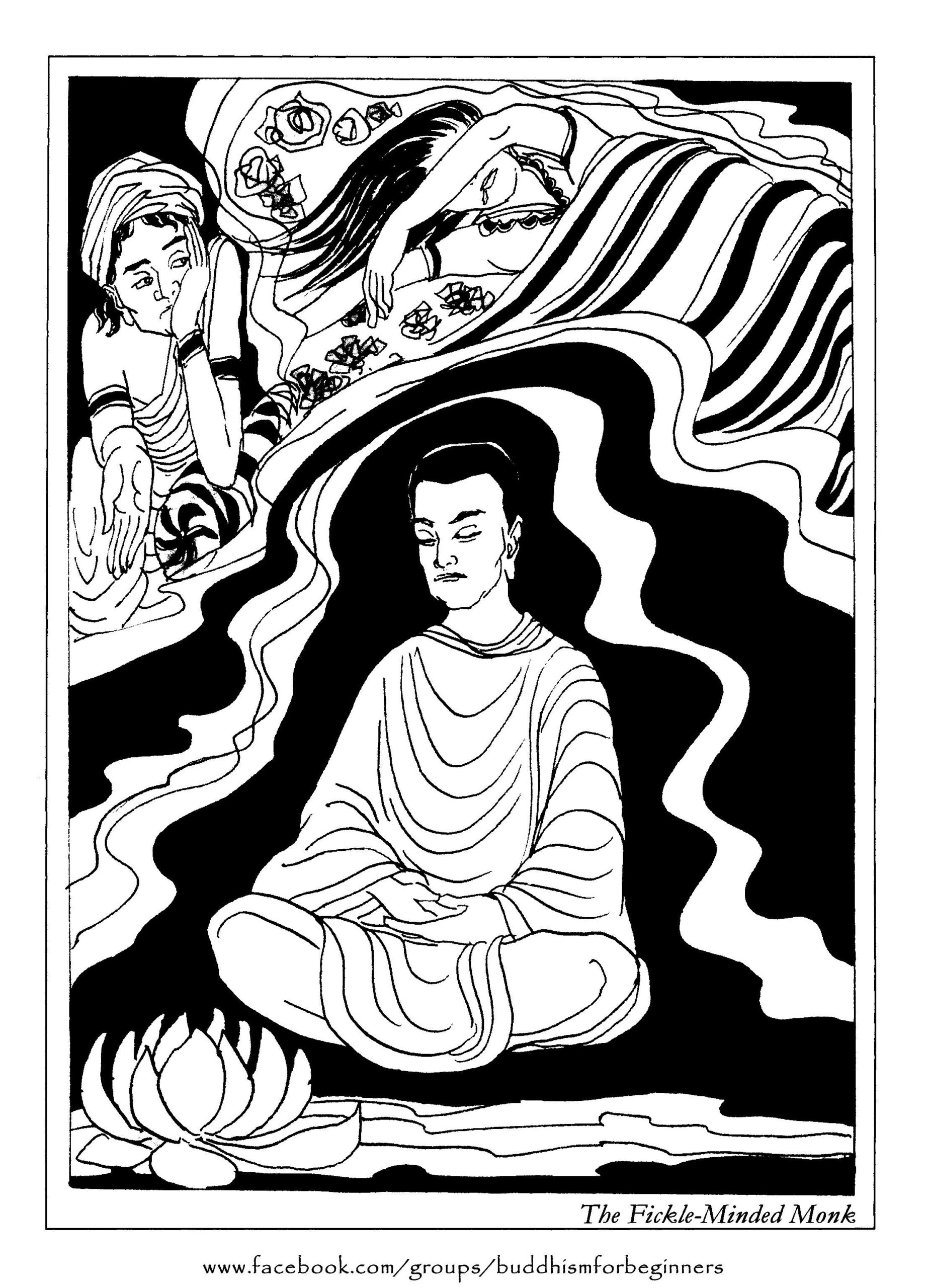A fickle-minded man will never attain perfect
Buddha (Dhammapada Verse 38)
wisdom, since he is ignorant of the Dhamma
and his faith is not steadfast.
The mind of the vigilant man is fearless,
Buddha (Dhammapada Verse 39)
It is free of lust and anger.
It has abandoned both good and evil.
CITTA HATTA HAD BEEN LOOKING for one of his oxen gone
astray in the woods for quite some time when he started to feel
very hungry. He came upon a monastery and there he was given
something to eat. While he was having his meal, he could not help
but remark how the monks’ fare was better than what he himself
could normally afford even after a hard day’s work. So, on a whim,
he decided to leave his wife and home and become a monk.
Although he started off well by following the rules of the monastery, he slowly became bored with his new lifestyle and ended up
not even wanting to go out on his daily almsround. Soon he was
feeling restless and longed so much for his wife’s company again
that he finally left the Order and returned home. But after a while,
feeling that life at home was too hard, he returned to the monastery and became a bhikkhu again. Then feeling lonely once more,
he disrobed and went home to be with his wife again. He shuttled
back and forth like this between home and monastery six times.
The sixth time he returned to the householder’s life, his wife
became pregnant and he was delighted. Then one night as she lay
sleeping soundly, he went into their bedroom to admire her new
condition and found her snoring loudly, saliva running down the
side of her chin, and her clothes and hair in disarray. Seeing his
wife lying like that with her mouth open and her stomach bloated,
Citta Hattha could not help but think that she looked just like a
corpse.
Suddenly he felt a disgust arise within himself that surprised
him, but it was then that he realized the unpleasant and impermanent nature of the body. He stood there thinking, “I have already
entered the Order six times and each time I have disrobed because
of my lust for sensual pleasure. Now I have understood the true
nature of the body and will not be fooled again.” He decided to
leave home and become a bhikkhu once and for all. On the way to
the monastery he kept reflecting on impermanence and unsatisfactoriness and as a result attained the first stage of sainthood.
Back at the monastery, the bhikkhus were not at all eager to
see Citta Hatta again, for the notoriety of his fickle-mindedness
had become too well known among them. So when Citta Hatta
requested to be admitted into the Order once more, they all refused
to let him do so. “You have been shaving your head so often it is
like a whetting stone,” they chided. But Citta Hatta remained adamant and the bhikkhus finally relented.
Several months passed, and although Citta Hatta had still not
disrobed, his fellow bhikkhus remained doubtful of his determination to lead the holy life. They started to tease him by asking him
when he was going back to see his wife again. He would answer
them by saying, “Previously, indeed, I used to return to the lay
life because I still had attachments, but now I have none.” The
bhikkhus told the Buddha what Citta Hatta said and the Buddha
replied, “His mind was not steadfast before and he did not understand the Dhamma but, now, he is already an arahat and has truly
discarded all attachments. This time Citta Hatta will not be going
home again.”
A fickle-minded man will never attain perfect
Buddha (Dhammapada Verse 38)
wisdom, since he is ignorant of the Dhamma
and his faith is not steadfast.
The mind of the vigilant man is fearless,
Buddha (Dhammapada Verse 39)
It is free of lust and anger.
It has abandoned both good and evil.




